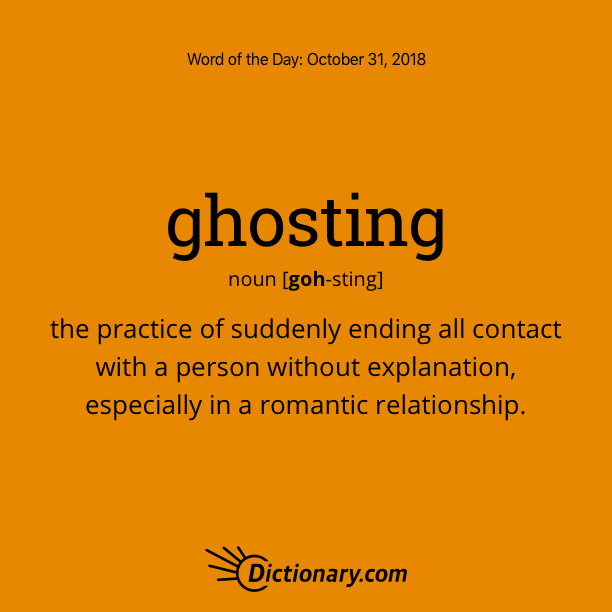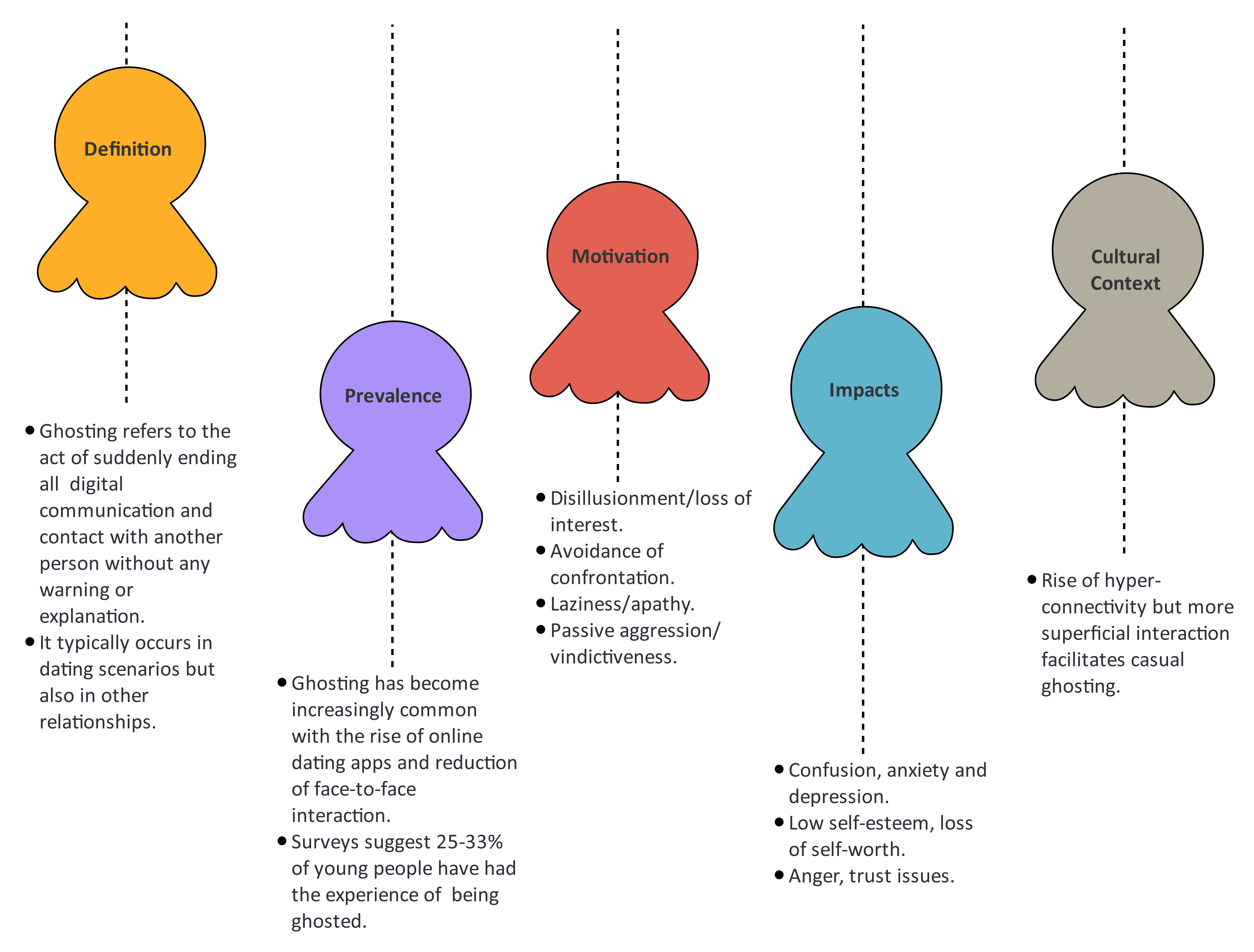Introduction
Ghosting is a relatively new term for an age-old phenomenon—cutting off all communication with someone without warning, explanation, or closure. In an era dominated by digital communication, ghosting has become increasingly prevalent, affecting romantic relationships, friendships, and even professional interactions. The psychological impact of ghosting can be profound, leading to confusion, self-doubt, and emotional distress.

What is Ghosting?
Ghosting is the act of abruptly ceasing communication with another person without providing an explanation. This behavior is most commonly associated with online dating, where interactions often begin and end with minimal personal investment. However, ghosting extends beyond romantic contexts to friendships, workplace relationships, and family dynamics.

The Rise of Ghosting in the Digital Age
Advancements in technology have made ghosting more prevalent. Social media, dating apps, and instant messaging have facilitated easy connections but also effortless disengagement. Unlike face-to-face relationships, where social accountability exists, digital interactions allow individuals to disappear without facing direct consequences. According to a 2018 study by Freedman et al., approximately 25% of adults have experienced ghosting in romantic relationships, with younger generations being more likely to both ghost and be ghosted.
Read More- Types of Attachment Styles
Why Do People Ghost?
Psychologists have identified several underlying reasons why people choose to ghost rather than communicate openly about ending a relationship.
1. Avoidance of Conflict
One of the most common reasons for ghosting is the avoidance of confrontation. Individuals who struggle with conflict or have anxious attachment styles may find it easier to disappear rather than face uncomfortable conversations (LeFebvre et al., 2019).
2. Emotional Discomfort
Ghosting often stems from emotional discomfort, where individuals lack the emotional maturity to handle difficult conversations. According to Koessler et al. (2020), people who ghost tend to have lower levels of emotional intelligence, making it harder for them to express their feelings effectively.
3. Fear of Hurting Others
Ironically, some people ghost because they believe that disappearing is a kinder way to end a relationship than direct rejection. They may fear that an honest conversation will cause more pain than silence (Navarro et al., 2021).
4. Diminished Social Accountability
In digital interactions, there is less accountability for one’s actions. When there is no mutual friend group or shared workplace, individuals may feel that ghosting is a consequence-free option (Freedman et al., 2018).
5. Overwhelm and Anxiety
Some individuals ghost due to emotional overwhelm. People with social anxiety or avoidant attachment styles may withdraw from relationships as a coping mechanism (LeFebvre et al., 2019).
6. Lack of Investment
In casual dating and superficial friendships, there may not be enough emotional investment to justify an official breakup or explanation. If the connection was minimal, some people may not see ghosting as a harmful act (Koessler et al., 2020).

The Emotional Effects of Ghosting
Ghosting has significant psychological effects, particularly on the person being ghosted. It can trigger feelings of rejection, self-doubt, and anxiety. Additionally, ghosters may also experience guilt and unresolved emotions.
1. Effects on the Ghosted
- Emotional Pain and Confusion- Ghosting leaves the ghosted person without closure, leading to confusion about what went wrong. Humans are wired for social connection, and an abrupt severance can cause emotional distress similar to physical pain (Eisenberger et al., 2003).
- Self-Doubt and Low Self-Esteem- Being ghosted can make individuals question their self-worth. They may ruminate on past interactions, wondering if they did something wrong or were not “good enough” (LeFebvre et al., 2019).
- Increased Anxiety and Trust Issues- Ghosting can make people more anxious in future relationships. A 2020 study found that people who have been ghosted are more likely to develop fear of abandonment and trust issues in subsequent relationships (Koessler et al., 2020).
- Prolonged Grief and Lack of Closure- Unlike a traditional breakup where both parties acknowledge the end, ghosting leaves individuals in a limbo state. This lack of closure can prolong emotional pain and prevent healthy processing of the loss (Navarro et al., 2021).
2. Effects on the Ghoster
- Guilt and Emotional Avoidance- While ghosting may initially seem like an easy escape, many ghosters experience guilt and emotional turmoil. Some may avoid thinking about the situation to escape feelings of responsibility (LeFebvre et al., 2019).
- Pattern of Avoidance in Relationships- People who ghost are more likely to engage in avoidant behaviors in future relationships. This can create a cycle of poor communication and emotional immaturity (Koessler et al., 2020).
- Potential for Regret- Ghosters may later regret their actions, especially if they encounter their former connections in social or professional settings. This regret can cause long-term discomfort and social anxiety (Freedman et al., 2018).
How to Cope with Ghosting
The ways of coping with ghosting can involve-
For the Ghosted
For the individual who is ghosted, it can involve-
- Acknowledge Your Feelings – It is okay to feel hurt and confused. Allow yourself to process the emotions rather than suppress them.
- Avoid Blaming Yourself – Remember that ghosting says more about the ghoster’s emotional capacity than about your worth.
- Seek Closure Independently – Closure does not always come from the other person. Write a letter (even if you don’t send it) or talk to a friend for emotional support.
- Limit Social Media Checking – Avoid obsessively checking their profiles, as this can delay the healing process.
- Focus on Healthy Relationships – Engage with friends and family who value and respect you.
For the Ghoster
For the individual who does the ghosting, it can involve-
- Practice Open Communication – Instead of disappearing, try to communicate your feelings honestly, even if it is uncomfortable.
- Reflect on Your Actions – Consider why you ghost and whether this pattern is serving your long-term relationships.
- Apologize if Possible – If you regret ghosting someone, a sincere message acknowledging the disappearance can provide closure.
- Work on Emotional Growth – Therapy or self-help resources can help improve communication skills and emotional intelligence.
Conclusion
Ghosting is a modern relational issue with deep psychological consequences. While it may seem like an easy way out, it can lead to significant emotional distress for both parties involved. Understanding the psychological reasons behind ghosting and its effects can help individuals develop healthier communication habits. Encouraging open, honest, and respectful dialogue is essential for building strong and meaningful connections in an increasingly digital world.
References
Eisenberger, N. I., Lieberman, M. D., & Williams, K. D. (2003). Does rejection hurt? An FMRI study of social exclusion. Science, 302(5643), 290-292.
Freedman, G., Powell, D. N., Le, B., & Williams, K. D. (2018). Ghosting and destiny: Implicit theories of relationships predict beliefs about ghosting. Journal of Social and Personal Relationships, 35(6), 799-823.
Koessler, R. B., Kohut, T., & Campbell, L. (2020). When your partner disappears: A study of ghosting in romantic relationships. Journal of Relationships Research, 11, e12.
LeFebvre, L. E., Allen, M., Rasner, R. D., Garstad, S., Wilms, A., & Parrish, C. (2019). Ghosting in emerging adults’ romantic relationships. Imagination, Cognition and Personality, 39(2), 129-150.
Navarro, R., Larrañaga, E., & Yubero, S. (2021). Ghosting and psychological well-being: The mediating role of self-esteem. International Journal of Environmental Research and Public Health, 18(4), 2079.
Subscribe to PsychUniverse
Get the latest updates and insights.
Join 3,041 other subscribers!
Niwlikar, B. A. (2025, February 19). Ghosting: 6 Psychological Reasons Why People Disappear Without Explanation. PsychUniverse. https://psychuniverse.com/ghosting/



